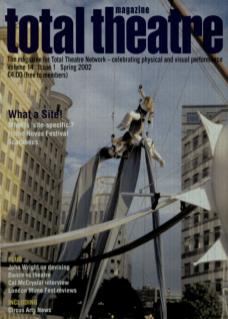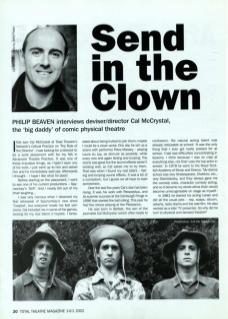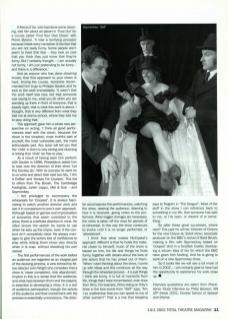I first saw Cal McCrystal at Total Theatre Network's Critical Practice on 'The Role of the Director'. I was looking for a director to do a work placement with for my MA in Advanced Theatre Practice. It was one of those impulsive things, as I hadn't seen any of his work. I just went up to him and asked him and he immediately said yes. Afterwards I thought ‘I hope I like what he does!’
Before starting on the placement, I went to see one of his current productions – Spymonkey's Stiff. And I nearly fell out of my chair laughing...
I was very nervous when I observed my first rehearsal of Spymonkey's new show Cooped, but everyone made me feel welcome. Cal included me in some of the games, looking for my real talent (I hoped). I fantasised about being invited to join them; maybe I could be a clown actor. One day he set up a scene with performer Petra Massey – playing Laura du Lay, as demure as possible, while every now and again farting and burping. The scene was good but the sound effects weren't working well, so Cal asked me to try them. That was when I found my real talent – farting and burping sound effects. It was a bit of a comedown, but I guess we all have to start somewhere.
Over the last five years Cal's star has been rising. It was his work with Peepolykus, and its surprise success at the Edinburgh Fringe in 1996 that started the ball rolling. This year he had five shows playing at the Pleasance.
He was born in Belfast, the son of the journalist Cal McCrystal (which often leads to confusion). His natural acting talent was already noticeable at school: 'It was the only thing that I ever got really praised for at school. I had real difficulties concentrating in lessons. I think because I was so crap at everything else, not that I was the top actor in school.' In 1978 he went to the Royal Scottish Academy of Music and Drama. ‘My drama school was very Shakespeare, Chekhov, etc, very Stanislavsky, and they always gave me the comedy roles, character comedy acting – and so it became my whole ethos that I would become unrecognisable on stage as myself.’
In 1981 he started his acting career and did all the usual jobs – rep, soaps, sitcom, adverts, radio drama and the odd film. He also worked as a kids' TV presenter. So why did he turn to physical and devised theatre?
A friend of his, who had done some clowning, told him about an advert in Time Out for a course called 'Find Your Own Clown' with Pierre Byland. It was a terrifying prospect because inside every comedian is the fear that you are not really funny. Some people don't seem to have that fear – they look so cool that you think they just know that they're funny. But I certainly thought I am actually not funny, I am just pretending to be funny – and there is a difference.
And as anyone who has done clowning knows, that first approach to your clown is hard. During the course, someone recommended him to go to Philippe Gaulier, and he took to the work immediately. ‘It wasn't that the work itself was new, but that someone was saying to me, what you do when you are standing up there in front of everyone, that is exactly right, that is what this work is about. I thought, that is very different from what they told me at drama school, where they told me to stop doing that.’
This approach gave him a whole new perspective on acting: 'I think all good performances start with the clown, because the clown is the simplest, most truthful part of yourself, the most vulnerable part, the most enthusiastic part. Any actor will tell you that the “child” in them is very strong and clowning is letting that “child” be free to play.’
As a result of having seen him perform with Gaulier in 1996, Peepolykus asked him to take over the direction of their show Let The Donkey Go. With its success he went on to co-write and direct their next two hits, I Am A Coffee and Horses For Courses. This led to offers from The Boosh, The Cambridge Footlights, Leikin Loppu, Mel & Sue – and Spymonkey.
I felt privileged to accompany the rehearsals for Cooped. It is always fascinating to watch another director work and see it in comparison to one's own approach. Although based on games and improvisation of scenarios that seem unrelated to the show, there is a definite direction in mind. He often knows the sketch he wants to use when he sets up the impro, even if the content isn't completely clear. He always manages to give the actors lots of confidence to play while letting them know very directly when it is crap, without elevating his own status!
The first performances of the work before an audience are regarded as an integral part of the devising process, a view echoed by fellow director John Wright who considers that a show is 'never completed, only abandoned'. Implicit in this is a sense that the audience, and what lives between them and the players, is essential to developing a show. It is a sort of audience participation, though the activity of the audience and their involvement with the process is essentially unconscious. The director accompanies the performances, watching the show, reading the audience, listening to how it is received, giving notes to the performers. When bigger changes are necessary, the show is taken off the road for periods of re-rehearsal. In this way the show continues to evolve until it is no longer performed, or 'abandoned'.
I think that what makes McCrystal's approach different is that he holds the material closer to himself; much of the show is based on him, his life and things he finds funny, together with details about the lives of the actors that he has prised out of them. 'When I start thinking about the show, I come up with ideas and this continues all the way through the rehearsal process – it is just things I think are funny. It is full of moments from life, things that I have remembered, even lines from films. For example, Petra sitting on Toby's knee in the love scene from Stiff says, Am I so unattractive that you can speak to me of other women?" That is a line that Arkadina says to Tregorin in The Seagull. Most of the stuff in the show I can reference back to something in my life, that someone has said to me, or I've seen, or dreamt of or something.’
So after these great successes, where next? This year he will be: Director of Clowns for the new Cirque du Soleil show; associate producer on the BBC's revival of Basil Brush; making a film with Spymonkey based on Cooped shot in a Scottish Castle; developing a sitcom idea of his for which the BBC have given him funding. And he is going to work on a new Spymonkey show.
So it looks like we will see a lot more of him in 2002... I am certainly glad to have had the opportunity to experience his work close up.
Interview quotations are taken from Practitioner Study Interview by Philip Beaven, MA ATP thesis 2001, Central School of Speech and Drama.


